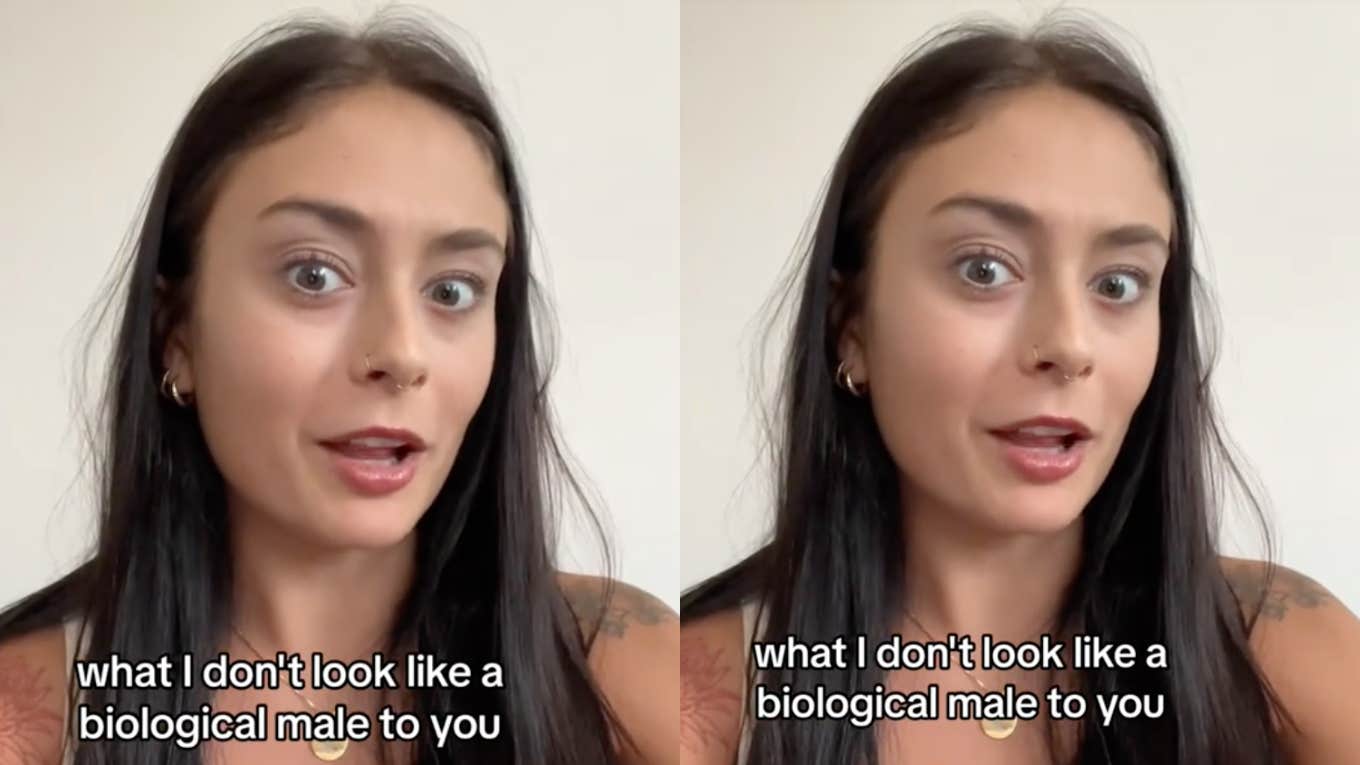Woman Explains How She Found Out She Was Biologically Male At 11 Years Old
We all exist in ambiguous spaces, no matter what our biological sex may be.
 intersexwitch / TikTok
intersexwitch / TikTok A woman named Lyss made her first-ever post on TikTok in a powerful way, sharing her identity and story, highlighting that there's no wrong time to show up in the world as your fullest, most authentic self.
The woman explained how she found out that she was biologically male when she was 11 years old.
In her TikTok post, Lyss looked directly into the camera, and said, "When I was 11 years old, my mom sat me down and told me I was biologically male." According to Lyss, her mom said, “We should probably have the talk.”
“I was so curious, I was like, I just want to know when am I gonna get my period? When am I gonna get my boobs? When do I get these tampons?” She wondered.
But Lyss’ mom revealed that she wouldn’t be going through puberty, not in the way she expected. Lyss explained, “She sat me down at the dining room table, all formal, with a folder of medical information, and says, ‘You are biologically male. You are not going to get a period. You are not gonna have kids. And, you are intersex.’”
Lyss had a visceral reaction, stating that “the wallpaper on the wall started to melt off, and I was sweating and freezing, and the entire world as I knew it completely crumbled.”
She recounted how her doctors and her parents told her to keep her identity as an intersex person a secret as a way to protect herself from being teased. “I did, for most of my life,” she explained. “And now, I’m a grown adult, talking to strangers on the internet about how I was born with balls in my belly.”
Lyss was praised for sharing her story as an entry point toward humanizing an experience that not many people are aware of.
As one person noted, “There is almost no intersex representation. Somewhere, some child is comforted by knowing they're not alone.”
In another TikTok post, Lyss answered questions from followers about being intersex, noting that she’s been on hormone replacement therapy since she was 11 years old. She explained that she takes estrogen because she doesn’t “have the organs to actually produce the estrogen on [her] own.”
When she was at the age to enter puberty, Lyss started hormone replacement therapy, “to kind of simulate a normal puberty, whatever that means.”
Despite being on estrogen since age 11, Lyss didn’t develop breasts until age 22, yet she noted that there “isn’t any scientific explanation” as to why she developed breasts when she did.
Lyss simply and directly explained why the recent legislative limitations on hormone replacement therapy are so dangerous.
“A lot of intersex people have to be on hormone replacement therapy because their body doesn’t produce the hormones on their own,” she stated. “And the hormones are still necessary for things like brain health and heart health, and everything else.”
In order for intersex people to survive, they need synthetic hormones, provided by hormone replacement therapy.
In 2018, the National Institute of Health conducted a national health study of intersex adults. In the study, the NIH researchers noted that “intersex variations, also known as differences of sex development (DSD), encompass a diverse set of congenital differences relating to gonads, chromosomes, and genitals that fall outside typical binary notions of male and female sex.”
The study also accounted for how intersex individuals have been treated historically, acknowledging that “since the 1950s, medical care for intersex people has centered around surgical interventions in infancy that place individuals in binary sex categories without their consent, designed to ‘fix’ ambiguities.”
The study continued, stating that “the focus on surgical intervention in childhood and infancy has contributed to a lack of understanding of the health needs of intersex adults over the life course.”
Of course, our lives are defined by ambiguities in so many ways, whether someone is intersex or not. It's rare that our lived experiences actually fall into one side or another. We are all existing in ambiguity, in some way. Lyss’ TikTok posts seem to serve a higher purpose. In discussing her own lived experience, she’s able to own her truth as an individual and also provide a wider context for what life as an intersex person is like.
Giving voice to what exists in the shadows of our lives not only removes stigma, it offers a powerful antidote to exclusion. For Lyss to tell her story is to claim space. In revealing her past, she’s making way for her future, creating a future where intersex people claim their seats at the table.
Alexandra Blogier is a writer on YourTango's news and entertainment team. She covers the LGBTQAI+ community, pop culture analysis and all things to do with the entertainment industry.

